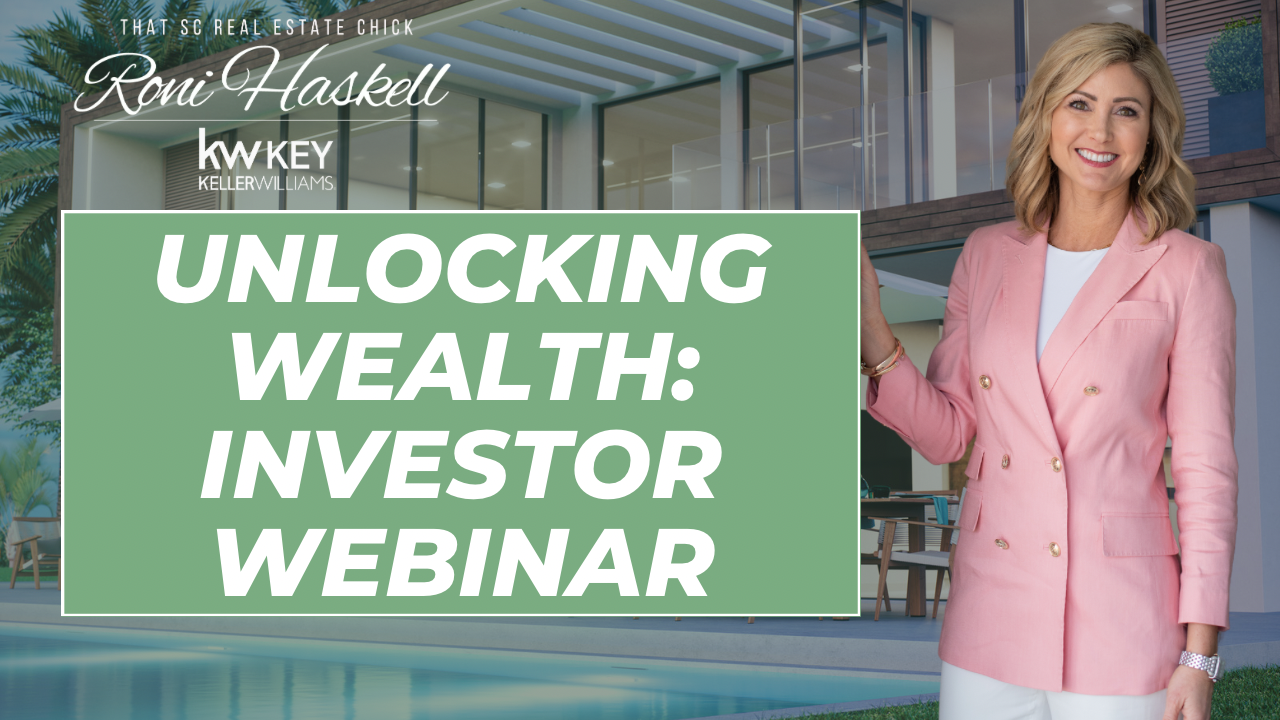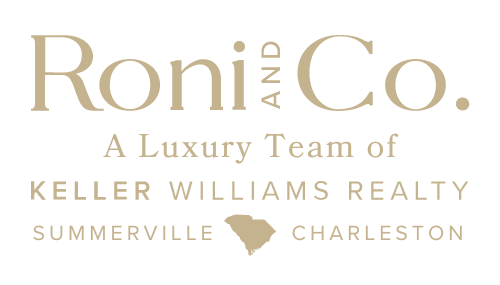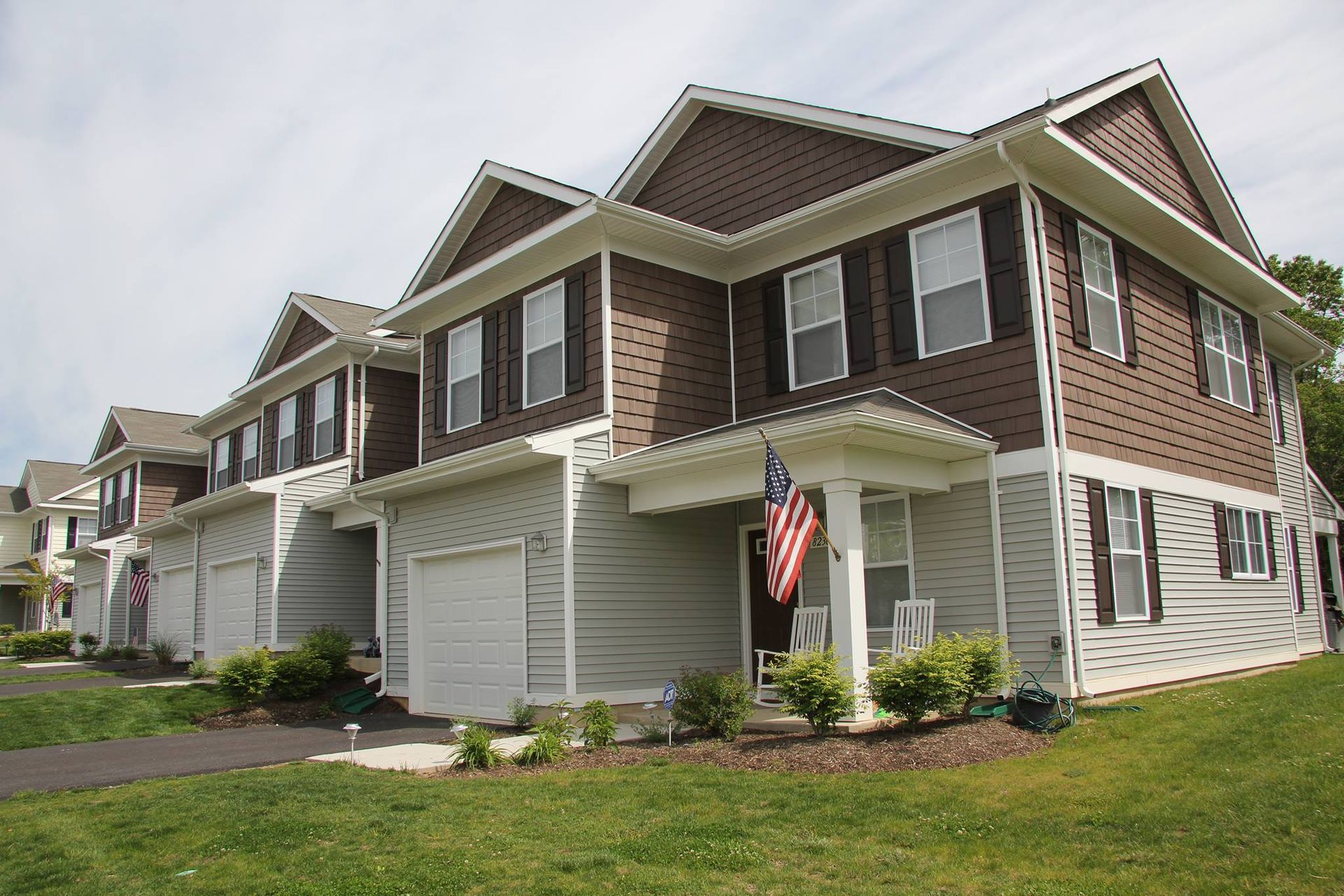Unlocking Wealth: Investor Webinar Transcript

Roni Haskell:
Thank you again for joining us today. We're 12:31, we've had several more pop on, thank you all. We are recording this, and so that we can also push it out for those that were not able to join us today. So I'm going to turn it over ... a good use of everybody's time. Russ is local here to the Charleston market. You guys have a couple of locations, I believe, right?
Russell Deal:
Yes, ma'am.
Roni Haskell:
Yeah, so you can work with people even out of state on their taxes and advising as well. I'm going to turn it over to you, you, again, are somebody that I trust, I've done business with, I send people to. And so thank you for being a part of our webinar here, and the floor is yours.
Russell Deal:
Sounds good. Thank you, Roni, I appreciate it. I'm going to share my screen out here, because I do have a little presentation. But before I share it out, just to follow up, a quick intro, I'm a CPA in the Charleston area. We have three offices, Mount Pleasant, West Ashley, and Summerville. I'll have my contact information up on the slide, but feel free to reach out if you need some help yourself, or know somebody that needs some help. We have a very wide range of services that we offer. And within our firm, we're big enough to kind of also have that wide range of knowledge as well as depth of knowledge. So I'm going to share my screen out right now, it's just a PowerPoint to kind of help me gather my thoughts. I'm not just going to read from it, try and be a little bit more exciting than that, but this is me.
I'm with Veris, we call ourselves the proactive CPA. I will touch on that a little bit later, but that's my email address and contact phone number. But if you Google Veris CPA in Charleston, Summerville or Mount Pleasant, you'll find us. The agenda for this meeting, it's only 30 minutes, and taxes are what I do, so I can go a little bit long when I start talking about certain things. So I kind of built this out to make sure that we move things along and make sure that we have time for questions at the end. So the first thing, this is kind of generally four topics that we're going to cover, and then the last is going to be any questions that you guys have, I'll do my best to answer them while we're on this meeting. So first, tax implications and advantages for real estate investments.
Now, the primary advantage is that real estate activities, and not just investing, hold a very unique place in the tax code. There is an entire class of individual called a materially participating real estate professional, that has all sorts of advantages that are specifically written into the tax code. Whether that's the qualified business income deduction, which allows you to exclude up to 20% of your business activities from income tax, or using rental and other what are normally passive losses to offset active income. So that's the primary advantage to the real estate investing. A caution is that not everybody is able to take advantage. So I'm a CPA, I'm a professional myself, I will never be able to qualify as a materially participating real estate professional. Doesn't mean that my family may not, my wife might be able to qualify. So you can think about things like that.
But I, Russell, as a full-time CPA will never be able to be a materially participating real estate professional. And generally you never want to purchase real estate for the income tax benefits. It needs to be a good investment first, and once you find that you really just want to look to structure it so you can take advantage of any tax savings that are out there. And then kind of the ideal situation, and this is one of the things that's nice about real estate, is a lot of the investments that you find, they can be cash flow positive, but for income tax purposes actually generate losses, which is kind of the ideal investment. Not only your wealth is increasing, because you've got this property that's increasing in value, if it can also cash flow itself and generate losses, you're also not really paying tax on the earnings that are coming in. So that's kind of the ideal situation. It's not uncommon, particularly with residential real estate, commercial not so much, but residential it's a very common situation.
But again, you got to make sure that you're eligible to take those losses when you need them. There's nothing more frustrating than thinking that you're going to have a significant loss coming through that's going to offset some taxable income that you might have, and then you find that maybe you can't take those losses for one reason or another. So getting with your CPA usually before the year ends, or honestly even before you get into the investing, kind of on the front end, is the ideal way to make sure that you're not surprised by any of these things. So I'm going to touch on a couple of specific tax items that are real estate specific. The first is a cost segregation study.
So a cost segregation study is when you basically engage a person who is half CPA and half engineer. It's a very, very, very specific niche group of people. And they will tell you, "Hey, you bought this million-dollar building, of this million-dollar building, $350,000 of it is eligible for accelerated depreciation." So normally you would depreciate that building over 39 years if it's commercial, but the accelerated depreciation, you're eligible to take bonus depreciation, which for 2024 right now means you can take 85% of that as a deduction in year one. So it's a way to create some massive losses really fast. Now, all it's really doing is creating a timing difference. You're going to take the depreciation, whether it's all today or whether it's spread out. The timing differences are one of the primary tools that we as tax professionals use to help people plan and ultimately create wealth for themselves.
You do need to be a materially participating real estate professional in order to use this strategy. What I've seen is you have lawyers, doctors that try and do this, doesn't really work. Sometimes they may have a spouse who could qualify as a real estate professional, so putting some of those investments in their name is kind of a way around those limitations. And I've seen these work best as part of a long-term strategy to use tax savings to create opportunities to quickly build a real estate portfolio. Whether you're adding a million dollars of property a year, 200,000... Well, 200,000 will be a little bit small, but 500 to a million dollars in properties a year, kind of stacking them year, over year, over year. So each year you're getting these big losses, you can use the tax savings that you would normally be paying out to the IRS to invest in the next property, and so forth and so forth.
Another one that I get a lot of questions on, and I'm actually... I've been kind of steering people away from these, is a 1031 exchange, also called a like-kind exchange. So since 2018, you can only do a like-kind or 1031 exchange with a real property, meaning real estate that you've invested in that's business property. And a lot of people think that they're really avoiding a gain when they do a 1031 exchange, but really all you're doing is deferring a gain into the future. It can be a good tool, but it definitely has some complications and some limitations.
It's such a complex transaction, and there are so many ways that it can go wrong, that I really try not to go too much into detail when it comes to a 1031 exchange. But what it allows you to do is you basically take the basis in the old property, and that becomes your basis in the new property. So instead of recognizing the gain, you're deferring the gain into the future. But ultimately that gain comes due, unless of course you do a 1031 exchange and then you hold that property until you die, and then your heirs would get a step-up in basis, and then they could sell the property and have zero capital gain. But I try not to plan around dying, even though I know it's going to happen. That's a whole different conversation.
So the specific rules, you really only have 45 days to identify a replacement property if you're going to do a 1031 exchange. All the cash has to be held with a qualified intermediary. So when you go to close on the first property, rather than you getting the money, that money would go to a qualified intermediary, and they would hold it until you go close on the next piece of property. And then you must close on the replacement property within 181 days. And this is what I really don't like, for most of y'all who have done closings on a regular basis, you can think that something is going to close in May, it might actually be December before that property actually closes. And if you've planned on doing a 1031 exchange and not having a taxable gain, and all of a sudden you can't close on that property within 180 days, all of a sudden you have all this taxable income that you really weren't planning on.
So they're wildly complex, there's a number ways that they can go wrong, particularly if there's mortgages either on the original property or the replacement property. So before you just go into one of these transactions, you definitely want to talk to a professional to make sure that you're doing it right, and aren't going to find yourself with accidental taxable income. There are scenarios in 1031 exchanges where you can get what is called phantom income, which is really the worst type of income you can have. You get taxable income, but there's no cash to pay the tax. So it's kind of the worst case scenario.
Next topic I want to cover is leveraging CPA experience for strategic financial planning. Now, before I hop too much further, I'm not a financial planner, I'm a CPA, they are different rules. But I think that every real estate investor needs a team of people. And I broke it down into three parts, I'm sure Roni has a lot more than just the three that I've listed here. But I'm more focused on the finance side of these transactions. So you need a financial advisor, some sort of real estate expertise, whether that's a realtor, a broker, someone who is bringing people together to invest in these properties in a group. Or if you're a professional, you could serve as the real estate expertise on this and then a CPA.
So ideally, each of these professionals are kind of working with you with really one goal in mind, and that is to create and preserve wealth. That's the ultimate goal of investing. It's not necessarily to dodge and avoid taxes, although there can be tax benefits to it, but the end result of what you're trying to do is create wealth for yourself. So the financial advisor, he kind of has a bigger understanding about your entire financial outlook and what your goals are. Do you have a 10-year plan, 20 year plan? Do you want to retire in five years? He knows what your assets are, he knows what your liabilities are. That's the piece that I, as a CPA, very rarely see, I don't see your personal financial statement. If you have money in a checking account, I've got no idea, because that never hits your tax return.
But your financial advisor would kind of bring all that together and help you focus on trying to accomplish those goals, whatever they may be. You'd usually come up with them together. Then the real estate expertise... If you're a realtor, this is a role that you could serve in yourself. The primary goal is to help you identify opportunities and understand the market. Me as a CPA, I have no idea what anything is worth out there, not even my own house. But you, who are in the industry, can have an understanding right here. And I tell realtors all the time, "If you're not buying what you're selling, do you really believe in it yourself? If you're not finding those opportunities and investing, then how can you go out and sell investment properties to other people? No one is going to identify an opportunity like you are, you're going to see properties that probably would never even get to me as an opportunity. Because y'all are out there every single day, and you see what's out there, and you know it's a good deal, and you know what's not a good deal."
And then I shouldn't have put myself last, because I don't think I'm least, but a CPA helps you understand the tax ramifications of the investments. Ideally, you find someone who is proactive rather than reactive. If you're only talking to your CPA at this time of year, it's February right now, you're probably missing out. You really want to be meeting with them before the year ends, because once January 1st has rolled around, there's really not that much that you can do. So if you're not meeting with your guy or lady earlier in the year, reach out to them and ask them. So does that make sense? Good. And then navigating the legalities and regulations. So this is something that I get looped in on at the beginning when people start buying real estate, or really any kind of business activity at the very beginning.
And I would much rather be involved before someone starts, than after they call and they tell me, "Hey, I just bought six businesses, and I put them in an LLC, and I put it in my daughter's name." People do crazy stuff all the time. And what ends up happening is they may think they have a good idea, because they read something on the internet, or heard it on the radio, or saw it on TV, but the reality is they're really just creating kind of this administrative mess that probably me or another professional is going to have to unwind. And it can be pretty expensive. And I charge for my work, but I usually want to be adding value to something. I'd rather add value to you as a client, than just take your money to fix your messes that you've created because you didn't talk to us at the front end.
So the primary thing that... This is one of the first things you want to decide, is entity structure. There's several different ways that you can own investment properties. You can own them personally, like I, Russell Deal, could go out and I could buy a property. I could create an LLC, whether it's a single member LLC or a multi-member LLC, and we could buy a property and own it in that LLC. That would either go directly on our personal return on Schedule E, or if it's multi-member, you could have a 1065 and file a partnership return. Or you can create a corporation. So probably the most common two that I see are people who own it personally or in an LLC. I trend towards the LLC part, there's some administrative cost and headache to being a corporation that can be avoided with an LLC, and you can kind of get the same legal protection.
So understanding when you should create new entities. Should you have multiple properties under one LLC, or should you have each property in its own LLC? What actually is an LLC? So an LLC is really a legal entity, less so than it is a tax entity. There are some elections that you can make that affect how you're taxed, but in general, an LLC is something that's created with a Secretary of State, just like a corporation. And really all it's doing is it limits your liability. And then just understanding what type of entity structure is best going to serve your needs. So whether you're going to own it personally, in an LLC or a corporation, you want to have a plan. And it should ultimately move towards kind of accomplishing what it is you want to accomplish, which is one, to build and preserve wealth for yourself.
And I think a lot of the entity structure here is built more towards the preserving, limiting your risk when it comes to owning properties. Because anytime you own a property, even if you don't have tenants, there is some level of risk. Something can happen, and all of a sudden you have attorneys that are calling you, and they can sue you. So you want to be able to limit that risk kind of as early as possible, and limit and isolate the risk. So there are two different things. Limiting the risk is reducing what you could potentially lose, and isolating it means you want to have each property kind of stand on its own, so you couldn't have a problem with one property that could trickle down to other properties that you might have. For instance, you flip a house over here, buyer goes to sue you because you messed something up, or one of your contractors did.
Right or wrong, it doesn't matter, at the end of the day, it matters what a judge says. But if that was inside one LLC, your liability is limited. You may have other properties stacked up that you either own or in the process of flipping, and you don't want them to become vulnerable just because something happened with this one. So there's not one right answer for everybody, because each person is different. But usually you want to work with your CPA, or some combination of a CPA and an attorney, to determine the structure that's right for you before you even identify the property and make an offer on it. Because even just getting financing on things can be... You have to go about it differently, whether it's you owning it personally, an LLC, or a corporation. And protecting yourself and your assets, it's not just a tax question, but you really want to limit the risk. And there's a couple of different types of risks to consider.
So you could have a tenant or a buyer who could sue you, tenant falls down a broken stair, or a buyer, you mess up the disclosure. Those things are really long, who actually reads them? I hope the real estate professionals are actually reading them. And you get sued. Loan risk, what happens when you're unable to service the debt on your property? Are they going to be able to come after the other 10 properties you own, or are they just going to be able to come after this property? Are they going to come after your primary residence, or is it going to be limited to just this property?
And then market risk, this is one that's probably the most difficult to predict, but what is going to happen if this house that you bought here... Generally real estate tends to appreciate, but certain timings you may find yourself down here, it's all well and good unless your mortgage is up here. So I think most of us are old enough to remember when things like that happened, hopefully we never see it again in our lifetime. But those are kind of the three things that you're trying to limit. That went a little bit faster than I thought, Roni, I actually think that's the last slide that I have. So if anyone has any questions, I'm listening.
Roni Haskell:
Yeah. So one thing that I flagged as a question... And while we are making sure that everyone is able to post their questions, I think it's showing on our end that everybody can, but I'm getting some feedback that maybe they're restricted to that. But one question that I had on the LLC, so if we have each of the properties held in separate LLCs, when we go to file our taxes, do we file each of those separately, or does all of those LLCs come into our personal return?
Russell Deal:
It depends. If you're the only owner, they probably go directly on your return on Schedule E. So for income tax purposes, there's no difference between a single member LLC and you owning it personally, it's taxed the same. It's really just a legal structure with the state of South Carolina, it's reported the same.
Roni Haskell:
All right.
Russell Deal:
And I actually do usually recommend that individual properties get their own entity, to kind of segregate that risk in different properties.
Roni Haskell:
Yes. Well, and that really feeds into the whole concept of having the different advisors. And you're right, you had three, your financial advisor, your CPA, your real estate advisor. Really as I navigate mine, mine includes an attorney for sure in that sector as well. Of course I've mentioned before I've got a financial advisor, an inspector, lender, attorney, CPA, and a contractor. Those are the meat of my pool of professionals, my go-to. But you're right, to get those things started early on, and then so you're not having to redo documents and go back through the legalities of putting things into separate LLCs and all of that later on, it's way easier to get that advice up front on the best structure to take.
Russell Deal:
It is. The attorney's a good one, I probably should have added that to the PowerPoint. Hopefully you only need them for closing, but if you flip enough houses or own rental properties long enough, you're going to need, or need them for something else, it's only a matter of time. So that's a good one to have.
Roni Haskell:
It is. And after you've transacted a few times... Or you can just rely on your real estate professional to put you in touch with the attorney who they're going to be closing with. A lot of the attorneys will charge very little up front to have that initial consultation just for the advising of it. And many of the attorneys will actually help set up trust as well, and so they can hold those different LLCs into a trust for another added layer of protection. Insurance, I guess that's another one to add into the portfolio, making sure you've got the right kind of insurance, and even an umbrella policy over it for legality purposes. Let's see if I had any other questions that I wrote down. Okay, one thing that you had made mention of on the cost segregation, which I personally have done cost segregation on my investment properties. If you own a property in an LLC, does it also qualify as a real estate professional? So if the real estate professional owns that LLC, it still qualifies as the cost segregation, correct?
Russell Deal:
If a property is owned in an LLC, it is still possible for you to take advantage of the cost segregation on that. Generally what people would do, is they would actually make an election to group their real estate activities together, because that's going to allow you to hit that materially participating real estate professional. For any residential rental it's rare that people are going to qualify with just one property, so they kind of group all those activities together, and then that would allow them to take the cost seg. But yes, even if it's in an LLC, you could still take advantage of the cost segregation study.
Roni Haskell:
Okay. So that's a key component if... And there are tax advantages for real estate professionals that others do not get. And do you mind kind of elaborating on that a little bit more, because a lot of our viewers are going to be real estate professionals. Or I know that one that is watching actually his wife is a real estate professional, to be able to transact their personal dealings primarily, so that's helpful as well. But can you elaborate more on the tax advantages for real estate professionals for investments?
Russell Deal:
Sure. The primary advantage is allowing you to use what are normally passive losses, whether it's rental income, which is generating a loss for you, allowing you to use passive losses to offset ordinary income. So if you take me, if I had a rental property that generated $30,000 in losses, I wouldn't be able to take that. It would go to zero for me, and I would carry those losses forward into the future until I ultimately sold that property. Even if... I couldn't offset the money from my practice, from a CPA. But if I was a realtor, and made the same money doing that, and had a rental property that generated losses, I would be able to use the losses from that rental property to offset my income as a realtor. So that's the primary advantage, is basically you're changing passive losses into losses that can offset ordinary income.
Roni Haskell:
Yes, okay.
Russell Deal:
And the cost seg really just creates timing differences, but timing differences are a great planning tool when it comes to your income taxes.
Roni Haskell:
Very good.
Kim:
Okay. We have a question here from Heidi. Her question is, what's the best first step to begin investing? She already has an LLC, what about business credit or income eligibility?
Roni Haskell:
I guess that goes more into the real estate professional and financial side than it does the CPA, wouldn't you agree, Russ?
Russell Deal:
I actually think it goes into both. So one of the first steps, if you've created the LLC, what is it you're trying to do? So you probably want to meet with a financial advisor, meet with your tax professional, to tell them what it is you're trying to do so that they can help you make sure things are structured to where it's going to be most advantageous for you. When it comes to the actual mechanics of getting a transaction done, someone like Roni or your bank is who's going to help you kind of get that financing in place in order to be able to take that actual first step. But as far as getting everything in place so things are structured right, I would meet with your financial advisor and your CPA, and just outline with them, "This is what I want to accomplish. I want to buy three rental properties a year for the next five years. I want to buy three houses a year, fix them up and flip them one a year for the next five years."
Are you buying to hold? Are you buying to sell? Are you ultimately buying [inaudible 00:25:05] kind of move up on your personal house? Because a lot of times people will either own a house themselves, live in it for a while, and then rent it out or vice versa. They might rent out the house that they want to live in, and eventually move into it. So just get with those professionals, and make sure that they understand what it is that you're trying to accomplish, then they can help you structure things in a way that's most beneficial to you. And then talk to your realtor.
Roni Haskell:
Yeah, get your realtor involved early on. Yeah, so it is imperative to have those initial conversations with the financial advisor. Because they can tell you, I've had one investor even ask me, "Should I pull money out of an investment fund in order to buy the real estate?" And so it's just really switching money from... It's reallocating money from one investment fund to another. I mean, I don't even care if it's buying your personal home, it's still an investment. And so you kind of have to look at it that way. In the future, will you be able to sell it, make money on it? Is that the goal? So yeah. But I will tell you, there are a lot of investors so to speak in the Charleston market. So having those conversations upfront and early with those advisors, going ahead and speaking with a lender, if you plan on holding it long-term, you probably are going to want to go into more of a conventional style loan, 20% down kind of structure, maybe even 25% down to get the best interest rate.
Or if it's a flip house, maybe a hard moneylender. If you're using your own cash, having a letter stating what your assets are in the bank. But whatever format it is, we need to have that document in file, Heidi, so that we can know when we find the right property we execute on it very quickly. Because there is a saturation of investors in our market that I've never seen before. But really it's been post COVID, and we just have a lot of opportunity for investors.
Well, I would say we have a lot of investors, the opportunities are slim. And so when a good property comes on, people fight over it. And then just knowing what the layout is, if you need to formulate an LLC, it is not the time to be doing it from contract to close. It is really you've got to have [inaudible 00:27:21] ahead of time. So just taking those initial steps, having those conversations, figuring out what your goals are. And then once it's time, once you've done those steps, then it's time to execute. And as a real estate professional, that's where I step in and help you find that right property. So do we have any other questions from our viewers? And Kim, you are kind of monitoring that.
Kim:
I don't see any new questions.
Roni Haskell:
All right. Well, if there are any, I think people know how to find both of us. Russell, your information was on early. Give it one more time at the close here.
Russell Deal:
Yes, ma'am. Yeah, just russell.deal@veriscpa.com. ...the slide, if someone wanted to take a snip, and I'll share it real fast. But honestly, if you Google Veris and Russell, Veris, Charleston, Summerville, Mount Pleasant, it'll come up and you'll find us pretty easily. But there's my contact information.
Roni Haskell:
Very good. Well, thank you for your expertise, your words of wisdom here, we appreciate your insight. We're always wanting to learn and grow in this business. I'm Roni Haskell, I'm a local to Charleston real estate professional, and I can be found at thatscrealestatechick on social media and on the web. So, all right, that's it for now, thank you again so much.
Russell Deal:
Thanks, Roni.
That SC Real Estate Chick's Blog











